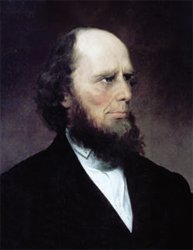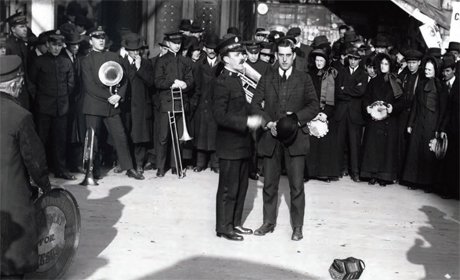|
When
Will Revival Come?
by Colonel Brian Tuck
 Revivalism
is the Protestant movement concerned with the conversion and
salvation of the individual and includes the attempt to appeal
to the masses on behalf of Christ. This term refers to strains
of 17th and 18th century strands of Anabaptism, Puritanism and
Pietism, which stressed personal religious experience, the
ideal of a holy life and the priesthood of all believers. It
was set against the spiritual lukewarmness and sacramentalism
of the established churches of the day. Yet, sadly, what began
as revival degenerated into “revivalism” as we know it today. Revivalism
is the Protestant movement concerned with the conversion and
salvation of the individual and includes the attempt to appeal
to the masses on behalf of Christ. This term refers to strains
of 17th and 18th century strands of Anabaptism, Puritanism and
Pietism, which stressed personal religious experience, the
ideal of a holy life and the priesthood of all believers. It
was set against the spiritual lukewarmness and sacramentalism
of the established churches of the day. Yet, sadly, what began
as revival degenerated into “revivalism” as we know it today.
Second Awakening
revivalist and Oberlin professor Charles Finney claimed that
revival of religion suggests first a declension: “It
presupposes that the Church is sunk down in a backslidden
state and a revival consists in the return of the Church from
her backslidings, and the conversion of sinners … ” Revival
brings fresh impulses to the saints in a new beginning before
God. The charm of the world is broken and the power of sin is
overcome by the power of the cross. Believers enjoy a new
foretaste of heaven and have new desires for union with God.
The worst of human beings are softened and transformed into
the beauty of holiness.
For all this to occur, the
Church first needs to repent and be reformed by the power of
God.
What is Revival?
 In our day the term
revival is greatly misunderstood. To some it is merely the
holding of evangelistic meetings; to others it means the
restoration of backsliders. But these are the by-products of
revival, not revival itself. William Sprague said that revival
occurs when religion rises from depression to life and
strength and Christians are more faithful in their
obligations. G.J. Morgan called it “reviving humanity … to the
sense of God … to reanimate the life of the believer, not the
regenerate.” Arthur Wallis defined revival as “God revealing
Himself to man in awful power and holiness.” Finney spoke of
it also as a new beginning before God, a breaking down of
heart, a getting down into the dust before God with deep
humility and a forsaking of sin. Jonathan Edwards described it
as “the goings of God.” In our day the term
revival is greatly misunderstood. To some it is merely the
holding of evangelistic meetings; to others it means the
restoration of backsliders. But these are the by-products of
revival, not revival itself. William Sprague said that revival
occurs when religion rises from depression to life and
strength and Christians are more faithful in their
obligations. G.J. Morgan called it “reviving humanity … to the
sense of God … to reanimate the life of the believer, not the
regenerate.” Arthur Wallis defined revival as “God revealing
Himself to man in awful power and holiness.” Finney spoke of
it also as a new beginning before God, a breaking down of
heart, a getting down into the dust before God with deep
humility and a forsaking of sin. Jonathan Edwards described it
as “the goings of God.”
Biblical Basis
According to J. Edwin Orr,
the best definition of revival lies in Acts 3:19: a “time of
refreshing from the presence of the Lord.” Our spiritual
deadness must be reanimated, our declension reversed as we
pray with Isaiah, “O, that you would rend the heavens and come
down … ” (64:1-3). Second Chronicles 28–29 indicates what must
be attended to if revival is to come to the house of God:
•The abused holy things
must be restored and the way of access reopened to God (28:24)
•The quenched lamps of
testimony must be relit (29:7)
•The incense of prayer
must ascend once again (29:7)
•We must return to the
sincere worship of God (29:6)
Revival holds back God’s
anger, according to Psalm 85:5-6. The Lord who walks among the
lampstands (Rev. 2:1-5) searches our hearts about
non-attendance at necessary worship (Heb. 10:25),
unreliability of service (1 Cor. 4:2) and unholiness of heart
and life (1 Thess. 4:7, 1 Peter 4:17). “But if anybody does
sin, we have one who speaks to the Father in our defense –
Jesus Christ the Righteous One” (1 John 2:1).
To all who seek Him, He
will disclose His lovely face and quicken all our drooping
powers. Too often we are like Absalom, who did not see the
face of his father for three years (2 Sam. 13:38). How long
has it been since you walked and talked with the Lord? He
alone “makes His face to shine upon you” (Num. 6:24-26).
In revival we become aware
of God’s grace (Rom. 6:14): “You are not under law, but under
grace.” Legalism and censoriousness are dealt a deathblow. “We
back up the hearse,” as Bud Robinson used to say, “load up
carnality and cart it away!”
Revival also makes us
aware of God’s pace . By that I mean we learn to distinguish
between the voice of God and the voice of Satan. The loud
feverishness of Satan’s demands gives way to the “still, small
voice.” Satan’s driving gives way to God’s leading—the vague
generalities of Satan yield to the specifics of the known will
of God. The “I want” of our lower instincts becomes the “I
ought” of the higher Christian life. Revival brings the
stilling of the heart: “Be still and know that I am God”
(Psalm 46:10, Mark 4:39).
Church History

Salvation Army Open Air meeting in New York City’s Bowery,
1915
Beginning with the Book of
Acts, the history of the Church is a history of revival. Those
28 thrilling chapters abound in instances of God breaking
supernaturally into the ordinary affairs of men. Central to
multiple conversions and the manifestation of spiritual power
was the person and work of the Holy Spirit. By 200 AD,
Tertullian could write, “We have filled all quarters of the
world.”
Sixty years later the
historian Eusebius told of people flocking to the religion of
Christ, with pagan altars deserted and the cultic mystery
religions virtually put out of business.
Patrick (A.D. 395 – 493),
the ”apostle of Ireland,” said that “I was reformed by the
Lord that I should concern myself for the salvation of
others.” Columba and others in the spirit of revival founded
churches, schools and monasteries. We ”swarmed like flies,”
declared Augustine of Canterbury, “into the dark places of
heathen Europe.” In the 12th century, the Waldenses, for whom
“every rock was a monument,” prepared the way for the Bohemian
Revival in which John Huss was martyred.
A new emphasis on the
Bible and preaching sprang from the 15th century Lollards
(preachers) under John Wycliffe. At the heart of the revival was
“making known the Scripture.” John Savonarola, unprecedented
as a preacher, changed the very face of the corrupt city of
Florence so that even the Sultan of Turkey ordered his sermons
to be translated into Turkish! Savonarola’s aim was simple:
“to be a regenerator of religion.”
During the Reformation
Martin Luther was used by God to free millions from spiritual
bondage, much of it through his prayers, study of the Word of
God and an emphasis on strong doctrine. John Calvin was
converted by reading the Bible and led a revival in Geneva
which caused the taverns and bars to close down. John Knox,
mighty in prayer, changed the face of history in Scotland in
1559. “O Lord,” he prayed incessantly, “give me Scotland or I
die!” God gave him Scotland!
In the mid-17th century,
with thousands adrift from the Church, George Fox heard a
voice declare, “There is one, even Jesus Christ, that can
speak to thy condition.” He yielded his life to Jesus,
stressing prayer, the Bible and the “inner light,” and founded
the Quakers (Society of Friends), which influenced The
Salvation Army.
We could go on to describe
the “Methodist Pentecost” which began, at a love feast in
Fetter Lane, London on January 1, 1739, but was itself
preceded by the Moravian Revival under Count von Zinzendorf.
Their “bands” underlined the settling of differences and
disputes and the ever–burning flame of prayer. Jonathan
Edwards helped to bring in the Great Awakening in America in
1735 with a new emphasis on family life and the Lord’s Day
when “the goings of God” were discerned in His sanctuary. And
so the movement continued through Whitefield, Asbury and
Finney with an emphasis on being “endued with power from on
high” and “constant fillings” of the Holy Spirit. And Finney
was a huge influence on Catherine Booth. Revival fires burned
on both sides of the Atlantic.
The Role of The Salvation Army
 The Army was born in the
superheated fires of revival, coming into being through
obedience, dedication and holy courage. It arose out of the
Home Mission of the Second Evangelical Awakening in 1859,
known as the “Year of the Right Hand of the Most High.”
William Allen wrote of “the amazing growth and worldwide
ministry of The Salvation Army” and “the spiritual causes of
this revival of religion. ” The heart of William Booth, a
16–year–old pawnbroker’s apprentice, was cleansed by the blood
and filled with Holy Spirit fire until “Blood and Fire” became
less a motto and more a way of life. There were more spiritual
luminaries in one square yard of Salvation Army sky, claims
one biographer, than in the century span of many other
organizations. Yet we may rightly question this in the today’s
climate of spiritual declension. How are the mighty fallen and
the fallen become mighty! The Army was born in the
superheated fires of revival, coming into being through
obedience, dedication and holy courage. It arose out of the
Home Mission of the Second Evangelical Awakening in 1859,
known as the “Year of the Right Hand of the Most High.”
William Allen wrote of “the amazing growth and worldwide
ministry of The Salvation Army” and “the spiritual causes of
this revival of religion. ” The heart of William Booth, a
16–year–old pawnbroker’s apprentice, was cleansed by the blood
and filled with Holy Spirit fire until “Blood and Fire” became
less a motto and more a way of life. There were more spiritual
luminaries in one square yard of Salvation Army sky, claims
one biographer, than in the century span of many other
organizations. Yet we may rightly question this in the today’s
climate of spiritual declension. How are the mighty fallen and
the fallen become mighty!
Revival has motivated
Salvationists in every country and territory. In South Africa,
early Salvationists were cast into prison, but revival broke
out in the jails! The individual foot–soldiers of Methodism
led to the shock troops of Salvationism as men and women
lived, sacrificed and died for the sake of the Gospel.
Holiness blazed from our banners and prayers and tears were
our meat and drink. Vibrant testimonies blistered our lips and
knee drills were crowded with earnest, believing prayers. But
what of today? That sovereign, sudden, searching work of God
(Hab. 3:2-6) appears to be missing except in isolated pockets
of “old-fashioned” resistance to post-modern theologies with
the emphasis on “bricks, budgets and bucks.”
Are we content with a
“baptized” self-indulgence, our identity blurred by a
pseudo-gospel which equates divine approval with affluence?
Have we forgotten the meaning of practical holiness with its
moral obligation to reach the socially poor and the
spiritually lost? Are we marked by a Christian character that
will stand the test of the Judgment Seat (1 Cor. 3, 2 Cor. 5)?
Duncan Campbell tells the
story of the Lewis Revival on that Scottish island in 1947. At
one meeting where the heavens appeared to be as brass, an old
deacon prayed in a climate of unusual spiritual hardness,
“Lord, you promised to pour out floods of water on the dry
ground … and you’re not doing it!” This was followed by a
silence and then he prayed again, “Lord, I challenge you to
now honor your word!” Then, said Campbell, that great
building, made of granite, shook like a leaf and people all
over the village were calling on the Lord to save them! That
is the revival that we need! And it is gloriously possible.
The Way Forward
Revivalist Leonard
Ravenhill suggested that the way forward, among other things,
required less playing and more praying, less feasting and more
fasting, less profession and more possession, less popularity
and more persecution, less lust and more trust. To be revived
we need a divine discontent, a homesickness for holiness, for
revival will only come when we are desperate, when we no
longer trust in religious organization or political
correctness, in material prosperity and popular preaching that
tickles the ear. We need to stand before the Lord in our true
state, “poor, miserable and blind,” desperate for revival.
The secret of William
Booth was not merely that he laid all on the altar, but that
he never took it back! There must be a return to simplicity,
to New Testament study and methods, with the Bible as the
model for service. Our focal point must again be the preaching
of the cross, the priority of the salvation of Christ as man’s
greatest need. Speculative theology and cold orthodoxy must be
put aside.
Then will “the Lord turn
again the captivity of Zion … our mouths filled with laughter,
and our tongues with singing: then said they among the
heathen, The Lord hath done great things for them …” (Psalm
126:1-6).
O Holy Ghost, revival
comes
from Thee,
Send
a revival, start the work in me;
Thy
word declares Thou
wilt
supply our need,
For
blessing now, O Lord,
I
humbly plead
|